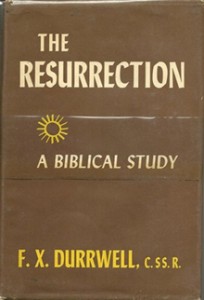by Father Robert Lauder
MEMORY PLAYS TRICKS on us but I am fairly certain that my recollection of studying the resurrection of Christ when I was a seminarian is accurate. At that time, over 50 years ago, we studied dogmatic theology from a manual, a kind of textbook. I doubt if any seminary courses today are based on manual theology. A great deal of what we studied in theology back then is now out of date but even then I was surprised at how little time and reading we devoted to Jesus’ resurrection.
Theology Changes In Time
When, at my bishop’s request, I went to Marquette University to pursue a doctorate in philosophy, I was able to minor in theology. I took two courses in theology with Bernard Cooke. One course was on grace, the other on the priesthood. They were the two best courses I have ever taken and Cooke was the best teacher I have ever had. At the time he was the chairman of the theology department and the emphasis was on the history of theology in contrast to the almost ahistorical approach to theology that was in the manuals. I suspect that was the first time I realized that theology changes in time, that it either develops, grows and expands or, unfortunately, narrows and becomes stale.
The lack of emphasis on the resurrection when I studied theology has changed dramatically. Now all Christian theology is centered on the resurrection. Not only is the entire New Testament now studied in light of the resurrection but also the Old Testament. Many things happened to bring about the change. One of the most influential events was the publication of The Resurrection: A Biblical Study (New York: Sheed and Ward, translated by Rosemary Sheed, 1960, pp. 371) by F.X. Durrwell, C.SS.R.
 It is probably impossible to overemphasize the impact that Father Durrwell’s book had. It is an excellent example to indicate that theology is historical: new insights are reached, new emphases happen and theology changes. Of course Catholic theology should never change in such a way that it contradicts Revelation or the Church’s infallible teaching.
It is probably impossible to overemphasize the impact that Father Durrwell’s book had. It is an excellent example to indicate that theology is historical: new insights are reached, new emphases happen and theology changes. Of course Catholic theology should never change in such a way that it contradicts Revelation or the Church’s infallible teaching.
In the Foreword to his book, Father Durrwell notes that some theologians studied redemption without mentioning the resurrection, that Christ’s work of redemption was looked at as consisting in His incarnation, His life and His death on the cross. After lamenting the neglect of the resurrection in the study of redemption and its absence in the thought of many theologians as one of the inexhaustible mysteries of our salvation, Father Durrwell writes the following:
“When the Resurrection was mentioned, it was not so much to give it any part in our salvation as to show it as Christ’s personal triumph over his enemies, and a kind of glorious counterblast to the years of humiliation he had endured to redeem us. In short, Christ’s resurrection was shorn of the tremendous significance seen in it by the first Christian teachers, and relegated to the background of the redemptive scheme. Such blindness naturally impoverished the whole theology of the Atonement.
“Yet all that was needed was to listen to St. Paul, who says categorically:
‘And if Christ be not risen again, your faith is vain, for you are yet in your sins. (1 Cor. Xv, 17)
‘Christ died for all …died for them, and rose again. (2 Cor. V. 15)
‘Who was delivered up for our sins, and rose again for our justification. (Rom. 1 v. 25)’
“This book was born out of my excitement over these key-texts of St. Paul, and a wish to share with others this tremendously helpful realization of the mystery of Easter” (p. xx111).
Though I am no historian, I think that around the time that dogmatic theology was changing, there was also a scriptural renewal, the liturgical movement and significant changes in the study and understanding of spirituality. All of these were influenced by a renewed interest and insight into Christ’s resurrection.
The Lenten season is ultimately about Christ’s resurrection and our share in that great mystery. Though we are encouraged to fast, do penance and give alms during Lent, the season should never only be about us. If our Lenten experiences are not about our relationship with the Risen Lord, then I have no idea what Lent means. It certainly should never be some kind of ego trip or some kind of “religious narcissism.” Rather it should be the opposite.
Our Lenten experiences should open us to deeper relationships with the Lord and with our brothers and sisters in Christ.
Perhaps one word can sum up our reaction to the resurrection: Alleluia!
Father Robert Lauder, a priest of the Diocese of Brooklyn and philosophy professor at St. John’s University, Jamaica, writes a weekly column for the Catholic Press.
